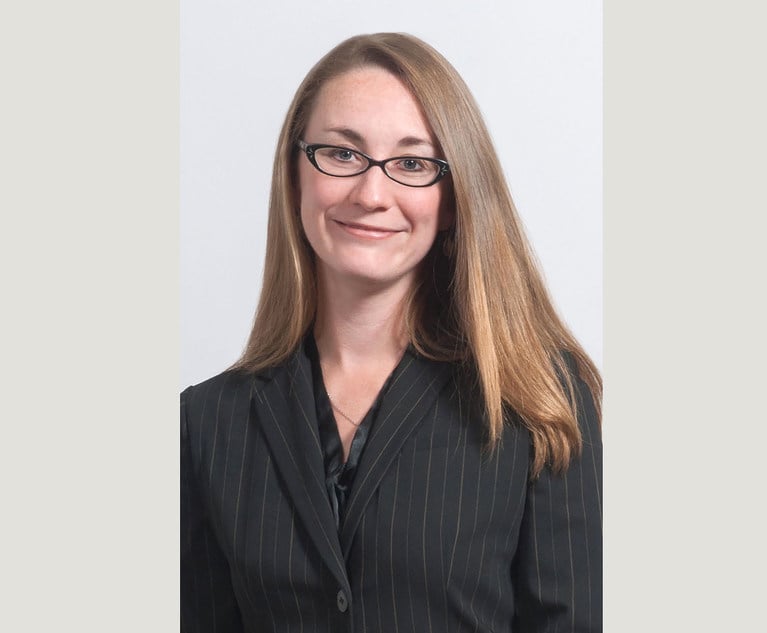Access to Plaintiff-Friendly Jurisdictions Constrained in 'Game-Changing' SCOTUS Ruling
Monday's landmark decision by the U.S. Supreme Court in "Bristol-Myers Squibb v. Superior Court of California" has already had a massive impact.
June 20, 2017 at 06:00 PM
22 minute read
“The big one.” “A major victory.” “A game changer.” That's how many lawyers in the defense bar described Monday's landmark decision by the U.S. Supreme Court in Bristol-Myers Squibb v. Superior Court of California.
They're not too far off. In mere hours, a judge in Missouri ended a pivotal trial over Johnson & Johnson's baby powder because of the court's decision, granting a mistrial in a courtroom in St. Louis, a venue favored by many plaintiffs.
Even plaintiffs lawyers concede that Bristol-Myers took a hatchet to a lucrative growth area in mass torts: Lawsuits brought on behalf of dozens of individuals in venues considered more favorable to plaintiffs, such as certain state courts in California, Illinois, Missouri and Texas. The court held that plaintiffs in such a case against Bristol-Myers Squibb Co. — referred to as a “mass action” — had failed to establish specific jurisdiction because there wasn't enough of a link between their claims and California, where they brought their lawsuit. The ruling, like many of the Supreme Court's prior decisions on jurisdictional matters, tightened the rules on where corporate defendants can be sued.
This content has been archived. It is available through our partners, LexisNexis® and Bloomberg Law.
To view this content, please continue to their sites.
Not a Lexis Subscriber?
Subscribe Now
Not a Bloomberg Law Subscriber?
Subscribe Now
NOT FOR REPRINT
© 2025 ALM Global, LLC, All Rights Reserved. Request academic re-use from www.copyright.com. All other uses, submit a request to [email protected]. For more information visit Asset & Logo Licensing.
You Might Like
View All
The Changing Landscape of NY Courts' Jurisdiction Over Out-of-State Corporations
14 minute read
Latest Tranche of Amendments to Court of Chancery Rules Includes Tweaks To Certain Fees Schedules
2 minute read
Closing 'Unacceptable Loopholes': How Sex Abuse Claimants Could Gain Power in Chapter 11 Bankruptcies
4 minute read
Improperly Pled Bitcoin Suit Leads to $88K in Attorney Fees Being Wiped Out
5 minute readTrending Stories
- 1Public Notices/Calendars
- 2Wednesday Newspaper
- 3Decision of the Day: Qui Tam Relators Do Not Plausibly Claim Firm Avoided Tax Obligations Through Visa Applications, Circuit Finds
- 4Judicial Ethics Opinion 24-116
- 5Big Law Firms Sheppard Mullin, Morgan Lewis and Baker Botts Add Partners in Houston
Who Got The Work
J. Brugh Lower of Gibbons has entered an appearance for industrial equipment supplier Devco Corporation in a pending trademark infringement lawsuit. The suit, accusing the defendant of selling knock-off Graco products, was filed Dec. 18 in New Jersey District Court by Rivkin Radler on behalf of Graco Inc. and Graco Minnesota. The case, assigned to U.S. District Judge Zahid N. Quraishi, is 3:24-cv-11294, Graco Inc. et al v. Devco Corporation.
Who Got The Work
Rebecca Maller-Stein and Kent A. Yalowitz of Arnold & Porter Kaye Scholer have entered their appearances for Hanaco Venture Capital and its executives, Lior Prosor and David Frankel, in a pending securities lawsuit. The action, filed on Dec. 24 in New York Southern District Court by Zell, Aron & Co. on behalf of Goldeneye Advisors, accuses the defendants of negligently and fraudulently managing the plaintiff's $1 million investment. The case, assigned to U.S. District Judge Vernon S. Broderick, is 1:24-cv-09918, Goldeneye Advisors, LLC v. Hanaco Venture Capital, Ltd. et al.
Who Got The Work
Attorneys from A&O Shearman has stepped in as defense counsel for Toronto-Dominion Bank and other defendants in a pending securities class action. The suit, filed Dec. 11 in New York Southern District Court by Bleichmar Fonti & Auld, accuses the defendants of concealing the bank's 'pervasive' deficiencies in regards to its compliance with the Bank Secrecy Act and the quality of its anti-money laundering controls. The case, assigned to U.S. District Judge Arun Subramanian, is 1:24-cv-09445, Gonzalez v. The Toronto-Dominion Bank et al.
Who Got The Work
Crown Castle International, a Pennsylvania company providing shared communications infrastructure, has turned to Luke D. Wolf of Gordon Rees Scully Mansukhani to fend off a pending breach-of-contract lawsuit. The court action, filed Nov. 25 in Michigan Eastern District Court by Hooper Hathaway PC on behalf of The Town Residences LLC, accuses Crown Castle of failing to transfer approximately $30,000 in utility payments from T-Mobile in breach of a roof-top lease and assignment agreement. The case, assigned to U.S. District Judge Susan K. Declercq, is 2:24-cv-13131, The Town Residences LLC v. T-Mobile US, Inc. et al.
Who Got The Work
Wilfred P. Coronato and Daniel M. Schwartz of McCarter & English have stepped in as defense counsel to Electrolux Home Products Inc. in a pending product liability lawsuit. The court action, filed Nov. 26 in New York Eastern District Court by Poulos Lopiccolo PC and Nagel Rice LLP on behalf of David Stern, alleges that the defendant's refrigerators’ drawers and shelving repeatedly break and fall apart within months after purchase. The case, assigned to U.S. District Judge Joan M. Azrack, is 2:24-cv-08204, Stern v. Electrolux Home Products, Inc.
Featured Firms
Law Offices of Gary Martin Hays & Associates, P.C.
(470) 294-1674
Law Offices of Mark E. Salomone
(857) 444-6468
Smith & Hassler
(713) 739-1250






